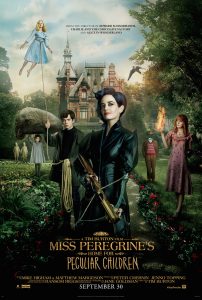The movie version of Miss Peregrine’s Home for Peculiar Children opens today, and since none of us regular reviewers have read the book, we’re happy to welcome guest reviewer Nathanael White:
Miss Peregrine’s Home for Peculiar Children by Ransom Riggs. Quirk books, 2011, 352 pages.
Reading Level: Teen, ages 12-15

At first glance, this novel doesn’t seem like a major digression from traditional fantasy/horror/witchcraft fiction. The three books that make up the series can be genuinely engrossing if the reader can push past the gore and darkness. The protagonist, Jacob Portman, is Peculiar—that is, born with special abilities (such as invisibility, levitating, an extra mouth, etc.). After the violent death of his grandfather, Jacob is able to enter one of the world’s many Loops. Loops are limited spaces that are frozen in time, where one experiences the same day over and over. Peculiar children are protected in the Loops by Ymbrynes—powerful, shape-shifting women who protect Peculiar children from vicious former Peculiars, known as Hollowgasts and Wights, that prowl the earth slaughtering Peculiars and eating their souls. Eating a Peculiar soul gives the predator the special capability of that soul. As the first book ends, the Loops are broken and Hollowgasts and Wights are able to invade the safe areas. Through the second and third books, the reader follows Jacob and his group of Peculiar friends through Loops of different times and places as they fight the entire underworld of Wights and Hollowtgasts to rescue their guardian, Miss Peregrine, and save Peculiardom.
A conflict waged on the spiritual level, as this one is, needs a moral center. Unfortunately, the story doesn’t seem to have one. For example, the following exchange occurs when Caul, a Wight, picks up a certain jar.
Miss Peregrine: This is wrong. There’s a Peculiar soul in there, and it should be treated with respect.
Caul: To be eaten by me would be the greatest respect a soul could be paid.
Miss Peregrine’s logic is shallow. The books present no reason why Caul shouldn’t eat any soul he wants. Though the characters occasionally mention God (mostly as an expletive), they find equal solace praying to their ancestors or just doing what feels right. Characters repeatedly make decisions about whom to kill and who to save based only on their feelings, and it’s all presented as right. Further, our sympathy for Miss Peregrine blinds us to her lack of moral foundation.
The books are gritty and quirky and the characters seem real as they struggle through repeated scenes of emotional conflict. These are all things teens love in a good story (even if the emotional levels are exhausting to adults). Parents recognize that the books create a choice between paths: the path of less resistance and the path of least resistance. But so many children, even those raised in loving Christian homes, struggle to understand and accept the basic concepts of morality and identity that Christians can only find in Scripture. The Miss Peregrine series undermines Christian ethics when its protagonists make dangerously ungrounded decisions about the value of human lives and souls. Ransom Riggs connects with teens—one simply has to glance at the online rave reviews to see how well his work has been received. But when young readers fall in love with such intense stories and characters they see the world through new ideas. If those characters and stories don’t have a moral foundation, they probably won’t see anything good.
Cautions: Language, worldview, violence
Overall rating: 3 (out of 5)
- Worldview/moral value: 2.5
- Artistic value: 3.5
Nathanael White is a college student and aspiring writer. He has a passion for reading and writing young adult literature, which he often does while pretending to do school. He is interested in journalism, politics, and Shakespeare.
Support our writers and help keep Redeemed Reader ad-free by joining the Redeemed Reader Fellowship.
Stay Up to Date!
Get the information you need to make wise choices about books for your children and teens.
Our weekly newsletter includes our latest reviews, related links from around the web, a featured book list, book trivia, and more. We never sell your information. You may unsubscribe at any time.
We'd love to hear from you!
Our comments are now limited to our members (both Silver and Golden Key). Members, you just need to log in with your normal log-in credentials!
Not a member yet? You can join the Silver Key ($2.99/month) for a free 2-week trial. Cancel at any time. Find out more about membership here.
3 Comments
Leave a Comment
You must be logged in to post a comment.


Thanks for this review. I am a librarian in a public elementary school, but my Christian worldview influences the books I introduce to my library. I have had several students ask about whether I have this book (or if I will get it for the library) and am now certain that I will not.
I watched the movie and my dad got me the book but sence I am still Christian the problem is that I see powers and some paranormal so I dont think its ok but I dont think its thats gory and I would definitely not say it is horror but more like dark fanticy.
age=13
Thanks for sharing your perspective, Emma. You’re showing some skills of perception already! It’s very important to think about what you see and read, so we’re happy to encourage you in that.